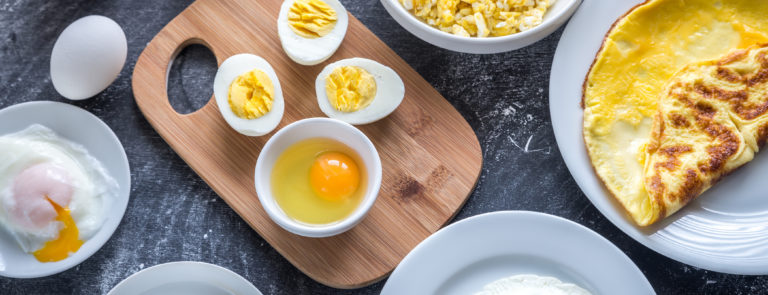15% off €25
5 healthy ways to cook eggs

Eggs and your diet
Eggs are a great addition as part of a healthy, well-balanced diet. They’re a great source of protein as well as vitamins and minerals, which include:1
- Vitamin D
- Vitamin A
- Vitamin B2
- Vitamin B12
- Folate
- Iodine
Different ways of cooking eggs
Eggs are a cheap and nutritious source of food.
A natural source of protein, they also contain relatively few calories and are packed full of nutrients, vitamins, minerals, healthy fats, and more – making them a perfect addition to any diet.
They can be cooked in many ways too, as well as combined with other food sources to make delicious and healthy combinations.
Here are just a few different methods of cooking an egg:
5 ways to cook eggs

1. Boiled
A typical hard-boiled egg (large) contains:
| Energy | Fat | Saturated fat | Protein |
|---|---|---|---|
| 77kcal | 3g | 6g | 3g |

2. Scrambled
Broken down, its nutrients would look like this:2
| Energy | Fat | Saturated fat | Protein |
|---|---|---|---|
| 197kcal | 15g | 4g | 5g |

3. Fried
A closer look at its nutritional info will shed some more light on this method:3
| Energy | Fat | Saturated fat | Protein |
|---|---|---|---|
| 196kcal | 14g | 4g | 13g |

4. Poached
Here’s their nutritional breakdown:
| Energy | Fat | Saturated fat | Protein |
|---|---|---|---|
| 148kcal | 10g | 3g | 13g |
5. Omelette
The nutritional value can vary depending on what ingredients you use, but a basic version contains the following:4
| Energy | Fat | Saturated fat | Protein |
|---|---|---|---|
| 93kcal | 7g | 2g | 6g |
Useful tips for cooking healthy eggs
Eggs can be as nutritious as you want them to be, so if you want to have a super healthy egg then follow these simple tips.
General advice for cooking eggs
-
Choose a low-calorie cooking method
If you’re trying to cut down on the calories, then your best option is to go with either a poached or a boiled egg.
This is down to the cooking methods, which don’t require any additional ingredients or oils.
-
Add in lots of vegetables
Eggs pretty much go with anything, but they pair really well with vegetables. If you’re making an omelette, don’t be shy with your ingredients – throw in some peppers or artichokes.
-
If frying, use an oil that can sustain high temperatures
If fried eggs are more your thing, it helps to use an oil that can withstand higher temperatures.
Some examples include sunflower oil or avocado oil.
-
Buy healthier, more nutritious eggs
The quality of an egg can depend on a number of factors, including the environment the chicken was raised and what kind of diet it had.
Purchasing organic and free-range eggs will go a long way in improving your meals.
-
Don’t overcook them
Overcooking an egg, particularly using a high heat, can damage its nutrients.
Cooking eggs can reduce their vitamin A content by around 20%, while it can reduce the number of antioxidants they contain.
Eggs that have been baked for 40 minutes may lose up to 61% of their vitamin D, compared to 18% when fried or boiled over a shorter time period.5
No matter how you choose to eat your eggs, you can guarantee a delicious and nutritious outcome every time.
Is it OK to eat eggs every day?
According to the NHS, there are no recommendations on the limit of how many eggs you should eat.6
Eggs can be eaten and enjoyed as part of a healthy, well-balanced diet. However, to keep them as healthy as possible without adding salt or fat.
For example, frying eggs can increase the fat content of eggs by around 50% - so it’s better to boil or poach them, without added salt or scramble without butter and using low-fat milk instead of cream.
Are sunny side up eggs healthier than scrambled?
As you’ll see from the above, there’s not a great deal in it. The healthiest way to have them is boiled.
Which is healthier - hard or soft boiled eggs?
It is thought that hard-boiled eggs are healthier, but this is mainly due to hygiene safety rather than health.
Because soft boiled eggs are only semi-cooked it is considered that the yolk in a soft boiled egg is more likely to carry salmonella than a hard boiled egg.7
However, it should be said that soft-boiled eggs do carry more protein than hard-boiled eggs.
Last updated: 26 August 2021
- https://www.healthline.com/nutrition/boiled-egg-nutrition#nutrition
- https://www.calorieking.com/us/en/foods/f/calories-in-egg-dishes-scrambled-eggs-2-large-eggs-w-1-tbsp-milk-and-1-tsp-fat/_kUyq91iRhm8Gc0FMdEpHg
- https://www.myfitnesspal.com/food/calories/fried-egg-713458050
- https://www.myfitnesspal.com/food/calories/french-omelette-1087187798
- https://www.healthline.com/nutrition/eating-healthy-eggs#High-heat-cooking-may-damage-other-nutrients
- https://www.nhs.uk/live-well/eat-well/eggs-nutrition/
- https://www.pinkvilla.com/lifestyle/food-travel/hard-boiled-eggs-vs-soft-boiled-eggs-which-one-safer-and-easier-make-593701



